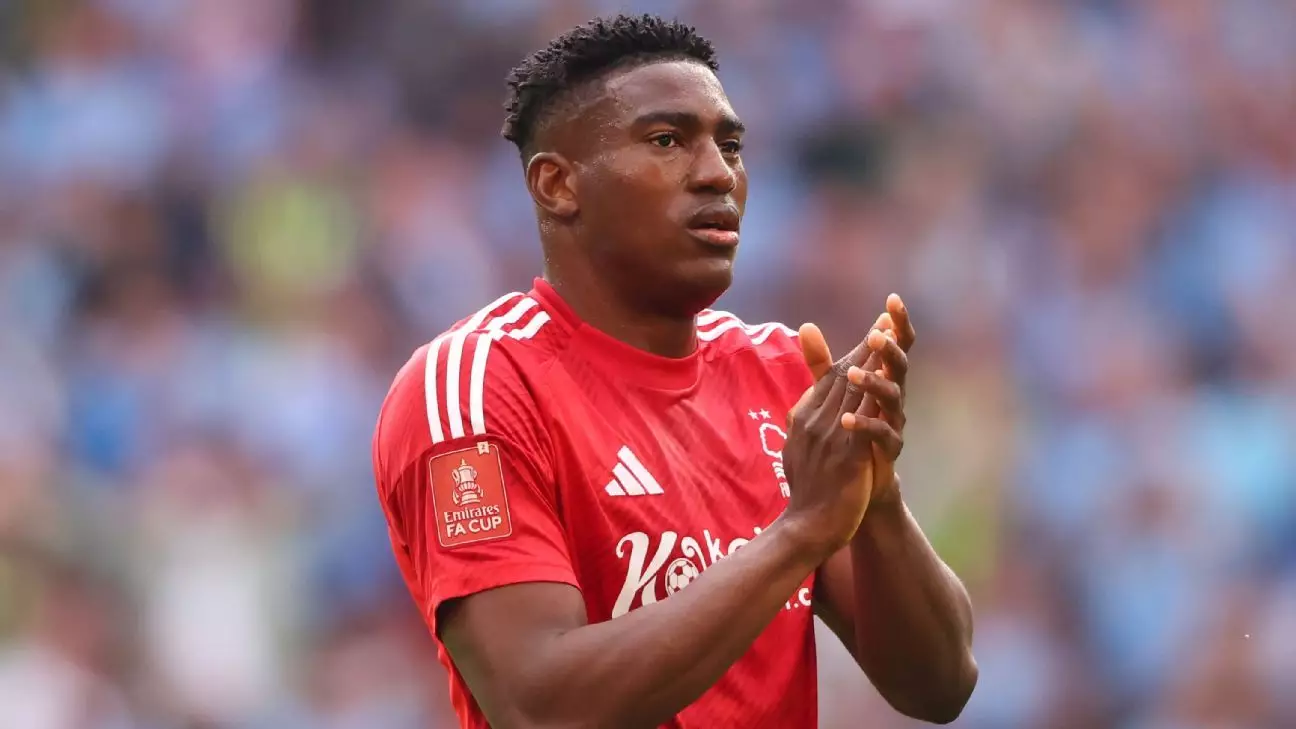The world of football is notorious for its unpredictability, and it can change in an instant. Such was the case for Nottingham Forest striker Taiwo Awoniyi, who found himself at the center of a harrowing situation during a recent match against Leicester City. Awoniyi, introduced as a second-half substitute, suffered a grievous abdominal injury after colliding with the goal frame. This unfortunate incident not only halted the game but also raised concerns about player safety and the quickness of medical responses in high-stakes matches. The ensuing chaos on the pitch has cast a shadow over Nottingham Forest’s ambitions for the season, as they strive for a coveted Champions League spot.
The Urgency of Medical Intervention
Following the injury, Awoniyi underwent “urgent” surgery that led to him being placed in an induced coma. This decision, while certainly alarming to fans and teammates alike, was made to assist his recovery. The coma serves to limit his movement and stabilize his heart rate, demonstrating the severity of his condition. In an age where medical advancements have improved athlete care, the gravity of this incident showcases an unsettling reality: injuries can drastically change not only a player’s career but potentially their life. Football fans everywhere are reminded of the physical toll the sport can exact on its players.
Club Dynamics Under Strain
The circumstances around Awoniyi’s injury also steered focus towards internal communication within Nottingham Forest. Following the match, club owner Evangelos Marinakis exhibited visible frustration towards manager Nuno Espirito Santo, underscoring a perceived lapse in communication between the medical staff and the coaching team. This moment reflected the precarious nature of decisions made at the peripheries of matchday management and illustrated the stakes involved when lives hang in the balance. It poses the question: how effective are existing protocols in emergency situations? Awoniyi’s situation could haunt the leadership at Nottingham Forest for seasons to come, serving as a reminder of the delicate equilibrium between ambition and athlete welfare.
Emotion in Leadership
Marinakis’ reaction on the field—his rush to intervene when he saw Awoniyi in distress—served as a powerful example of empathy and investment from a club owner. The statement released by Nottingham Forest later revealed that his actions were driven by a deep emotional connection to the players, one that transcends mere financial or operational responsibilities. In a sport where figures can often seem detached, Marinakis’ instinctive response paints a human picture amidst the competitive landscape of football. It is this emotional investment that can bind a team together, fostering loyalty and camaraderie among players, fans, and management.
The Champions League Dream at Stake
As Nottingham Forest vies for a Champions League spot, the implications of Awoniyi’s injury extend beyond his personal health. They exemplify the harsh unpredictability of football, where the loss of a key player can ripple through a season’s prospects. With only two matches remaining, the pressure mounts for the team. Currently sitting seventh and just one point behind fifth-placed Chelsea, every point counts. Yet the psychological weight of Awoniyi’s injury may affect not only their gameplay but also team morale. It raises the stakes for how they respond collectively and manage to rally around this incident, a testament to both their spirit and resilience.
A Broader Reflection on Player Welfare
This incident shines a light on a critical yet often overlooked aspect of professional sports: player welfare. The risk of injury is inherent, but how clubs manage these injuries when they occur speaks volumes about their commitment to their athletes. The conversation around mandatory enhanced training for coaches and clearer communication channels on health matters becomes ever more pressing. How equipped are teams to handle crises? Awoniyi’s condition brings this debate back to the forefront, emphasizing that the responsibility does not end with the whistle—there’s an ongoing duty of care.
Awoniyi’s journey is not just a personal story but a focal point that challenges all stakeholders in football to reflect on their responsibilities. The future of the sport hinges upon our ability to balance competitiveness with humanity, an equilibrium that will ultimately redefine what it means to truly care for the athletes we watch.

